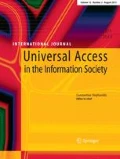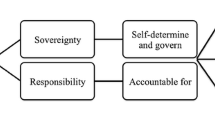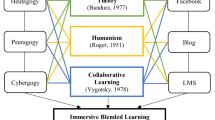Abstract
The aim of the ECODESIGN project was the development of a course in sustainable product design. The target group are employees in the areas of product design, marketing or similar areas. Some learners from this target group have a low computer literacy and are, therefore, reluctant to use advanced forms of electronic communication. Collaborative learning has to be designed according to the learners’ needs, taking into account that many participants of the ECODESIGN course have to get used to electronic communication. Despite this problem, a community of practice seems to result from the ECODESIGN course. Active tutoring was especially important to motivate learners and to constitute the community of practice.



Similar content being viewed by others
References
Allen, P., Booth, S., Crompton, P., Timms, D.: Varsetile––A TLTP Funded Project. Case Studies: Integrating Learning with Technology. University of Stirling, Stirling (1996)
Ardito, C., Costabile, F., De Marsico, M., Lanzilotti, R., Levialdi, S., Roselli, T., Rossano, V.: An approach to usability evaluation of e-learning applications. Univ. Access Inf. Soc. 4(3), 270–283 (2006). doi:10.1007/s10209-005-0008-6 (ISSN 1615-5289)
Aula, A.: User study on older adults’ use of the web and search engines. Univ. Access Inf. Soc. 4(1), 67–81 (2005). doi:10.1007/s10209-004-0097-7 (ISSN 1615-5289)
Beasley, N., Smyth, K.: Expected and actual student use of an online learning environment: a critical analysis. Electron. J. E-Learn. 2(1), 43–50 (2004)
Clark R.C., Mayer R.E.: E-Learning and the Science of Instruction. Wiley, San Francisco (2003)
Crystal D.: Language and the Internet. Cambridge University Press, Cambridge (2001)
De Marsico, M., Kimani, S., Mirabella, V., Norman, L., Catarci, T.: A proposal toward the development of accessible e-learning content by human involvement. Univ. Access Inf. Soc. 5(2), 150–169 (2006). doi:10.1007/s10209-006-0035-y (ISSN 1615-5289)
Dillenbourg P.: What do You Mean by ‘Collaborative Learning’?, pp. 1–19. Elsevier, Oxford (1999)
Duffy T.M., Jonassen D.H.: Constructivism and the Technology of Instruction––a Conversation. Lawrence Erlbaum, Hillsdale (1992)
Ebner, M., Holzinger, A.: Lurking: an underestimated human–computer phenomenon. Multimed. IEEE 12(4), 70–75 (2005)
Encarnacao J.L., Leidhold W., Reuter A.: Szenario: Die Universität im Jahre 2005, pp. 17–29. Verlag Bertelsmann Stiftung, Gütersloh (2000)
Forsyth, L., Schaverien, L.: Re-presenting collective learning: a generative way forward. ACM SIGGROUP Bull. 24(3), 25–31 (2003)
Gibbons, J.F.: Tutored videotape instruction. In: Conference on Educational Applications of Satellites, Arlington, 1977
Holzinger, A.: Usability engineering methods for software developers. Commun. ACM 48(1), 71–74 (2005)
Isckia, T., Delalonde, C.: Student communities in a distance-learning environment. ACM SIGGROUP Bull. 24(3), 73–78 (2003)
Jarvis, P., Holford, J., Griffin, C.: The Theory & Practice of Learning, 2nd edn. Kogan Page, London (2003)
Keates, S.: Pragmatic research issues confronting hci practitioners when designing for universal access. Univ. Access Inf. Soc. 5(3), 269–278 (2006). doi:10.1007/s10209-006-0050-z (ISSN 1615-5289)
Keates, S., Clarkson, J., Robinson, P.: Design for participation: providing access to e-information for older adults. Univ. Access Inf. Soc. 3(2), 149–163 (2004). doi:10.1007/s10209-004-0093-y (ISSN 1615-5289)
Koper, R., Tattersall, C.: New directions for lifelong learning using network technologies. Br. J. Educ. Technol. 35(6), 689–700 (2004)
Lave J., Wenger E.: Situated Learning. Legitimate Peripheral Participation. Cambridge University Press, Cambridge (1991)
Nielsen J.: Erfolg des Einfachen. Markt + Technik Verlag, München (2000)
Payr, S.: Facile––concept for facilitation and role of facilitator. Working document for the SOCRATES/ODL project FACILE (2000)
Pohl, M.: Guidelines for the design and evaluation of e-learning systems. In: Proceedings of the EDEN 06 Annual Conference, Vienna, pp. 542–547 (2006)
Pohl, M., Rester, M.: Development of an e-learning system for ecological product design. In: Isaýas, P., Kommers, P., McPherson, M. (eds.) Proceedings of the IADIS International Conference e-Society 2004, vol. 2, p. 1163. IADIS Press, Lisbon (2004) (ISBN 972-98947-5-2)
Pohl, M., Rester, M.: Ecodesign: Development and testing of an e-learning system. In: Auer, M., Auer, U. (eds.) ICL: Interactive Computer Aided Learning. Proceedings of the International Conference, Kassel (2004). Kassel University Press (ISBN 3-89958-089-3)
Pohl, M., Rester, M., Judmaier, P., Stöckelmayr, K.: Ecodesign––design and evaluation of an e-learning system for vocational training. Elektrotechnik und informationstechnik (e&i) 122(12), 473–476 (2005) (ISSN 0932-383X)
Preece J.: Online Communities: Designing Usability and Supporting Sociability. Wiley, Chichester (2000) (ISBN 0-471-80599-8)
Preece J., Rogers I., Sharp H.: Interaction Design. Wiley, New York (2002)
Reichl, F., Payr, S., Csanyi, G.S., Vierlinger, U.E.: Joint European continuing education courses with facilitated open distance learning. Ind. High. Educ. 15(5), 323–332 (2001)
Reichl, F., Vierlinger, U.E., Obermüller, E.: Active learner support for e-learning in continuing engineering education: theory and practice. In: 9th World Conference for Continuing Engineering Education––Strategy of Continuing Engineering Education for International Competence and Cooperation, Tokyo, May 2004, pp. 507–511 (2004)
Rester, M., Pohl, M.: Ecodesign––an online university course for sustainable product design. In: Kommers, P., Richards, G. (eds.) Proceedings of EDMEDIA 2005. World Conference on Educational Multimedia, Hypermedia and Telecommunications. Montreal, Canada, pp. 316–323, Norfolk (2005). Association for the Advancement of Computing in Education (AACE) (ISBN 1-880094-56-8)
Rowntree D.: Exploring Open and Distance Learning. Kogan Page, London (1992)
Rudestam K.E., Schoenholtz-Read J.: Overview––The coming of Age of Adult Education, pp. 3–28. Sage Publications, Thousand Oaks (2002)
Sacks, H., Schegloff, E., Jefferson, G.: A simplest systematics for the organisation of turn-taking for conversation. Language 50, 696–735 (1974)
Salmon G.: E-Moderating. The Key to Teaching and Learning Online. Kogan Page, London (2000) (ISBN 0-7494-3110-5)
Savidis, A., Grammenos, D., Stephanidis, C.: Developing inclusive e-learning systems. Univ. Access Inf. Soc. 5(1), 51–72 (2006). doi:10.1007/s10209-006-0024-1 (ISSN 1615-5289)
Schlager M.S., Fusco J., Schank P.: Evolution of an Online Education Community of Practice, pp. 129–158. Cambridge University Press, Cambridge (2002)
Schön D.A.: Educating the Reflective Practitioner. Jossey-Bass, San Francisco (1987)
Schulmeister, R.: Virtuelle Universität––Virtuelles Lernen. R.Oldenburg Verlag, München (2001)
Schulmeister R.: Grundlagen Hypermedialer Lernsysteme. R.Oldenburg Verlag, München (1997)
Sheard, J.: Electronic learning communities: strategies for establishment and management. In: Proceedings of the ITiCSE’04 Conference, Leeds, pp. 37–41 (2004)
Sparkes, J.J.: On the design of effective distance teaching courses. In: Annual Conference of the International Council on Distance Education, Melbourne (1985)
Statistik Austria. IKT-Einsatz in Haushalten. Ergebnisse der europäischen Erhebung über den Einsatz von Informations- und Kommunikationstechnologien in Haushalten 2003, Vienna (2003)
Stevens, G., Veith, M., Wulf, V.: Come in: using computers to foster the integration of migrant communities. ACM SIGGROUP Bull. 24(3), 66–72 (2003)
Stöckelmayr, K.: E-learning und seine Evaluation. Master’s thesis, Vienna University of Technology (2006)
Tampir, P.: Anwendungsorientierte computerschulung für erwachsene. Master’s thesis, Institut für Gestaltungs und Wirkungsforschung, Technische Universität Wien, Wien (2006)
Vitsilakis, C., Efthimiou, I.: E-competences and e-learning: an empirical study of the relation between e-learning experience and adults digital literacy. In: Proceedings of the EDEN 06 Annual Conference, Vienna, pp. 52–58 (2006)
Wheeler, S.: Networking or Notworking? Building social presence into digital learning environments. In: Proceedings of the EDEN 06 Annual Conference, Vienna, pp. 371–374 (2006)
Wimmer W., Züst R.: ECODESIGN PILOT: Produkt-Innovations-, Lern- und Optimierungstool für umweltgerechte Produktgestaltung mit deutsch/englischer CDROM. Verlag Industrielle Organisation, Zürich (2001)
Woodrow, M.: The struggle for the soul of lifelong learning. Widening participation and lifelong learning, 1(1). ISSN 14666529. http://www.staffs.ac.uk/journal/vol1no1/ed-2.htm (1999)
Acknowledgments
The project “eLearning Kurs zu umweltgerechter Produktgestaltung/ECODESIGN” was financed by the European Social Fund (esf) and the Austrian Federal Ministry for Education, Science, and Culture.
Author information
Authors and Affiliations
Corresponding author
Rights and permissions
About this article
Cite this article
Pohl, M., Rester, M., Stöckelmayr, K. et al. Computer supported collaborative learning and vocational training: adapting the technology to the learners’ needs. Univ Access Inf Soc 7, 259–272 (2008). https://doi.org/10.1007/s10209-008-0119-y
Published:
Issue Date:
DOI: https://doi.org/10.1007/s10209-008-0119-y




